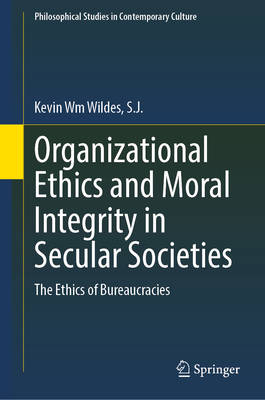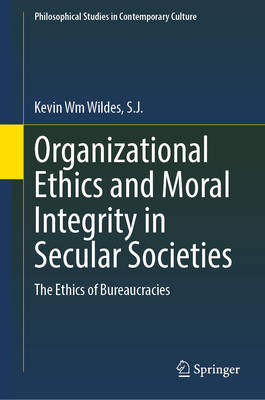
Wil je zeker zijn dat je cadeautjes op tijd onder de kerstboom liggen? Onze winkels ontvangen jou met open armen. Nu met extra openingsuren op zondag!
- Afhalen na 1 uur in een winkel met voorraad
- Gratis thuislevering in België vanaf € 30
- Ruim aanbod met 7 miljoen producten
Wil je zeker zijn dat je cadeautjes op tijd onder de kerstboom liggen? Onze winkels ontvangen jou met open armen. Nu met extra openingsuren op zondag!
- Afhalen na 1 uur in een winkel met voorraad
- Gratis thuislevering in België vanaf € 30
- Ruim aanbod met 7 miljoen producten
Zoeken
Organizational Ethics and Moral Integrity in Secular Societies
The Ethics of Bureaucracies
Kevin Wm Wildes S J
€ 116,45
+ 232 punten
Uitvoering
Omschrijving
This book explores an undeveloped area in postmodern thought: organizational ethics. Ethical debates and analyses usually focus on a particular act or action, an actor, and/or how a secular society should address any of those particular persons or events. In the Post Modern age, ethical decisions and policies are characterized by moral and cultural pluralism. However, there is a second factor that complicates ethical and policy decisions even further. This book argues that in the postmodern age ethical decisions often need to be understood as part of the decision making of organizations and bureaucracies. Organizational decisions often have direct bearing on the choices made by individuals. Two areas that exemplify postmodern issue are the areas of health care and education. For example the decision making of Admissions Officers in American higher education, are influenced by decisions that have been made by the university about the size of the class and the diversity of the class. Health Care organizations make policy decisions that affect every aspect of a patient's care from admission to treatment and the types of care that are or are not offered. Both education and health care are the object of the significant investment of resources, both areas are value laden in postmodern, pluralistic societies, and yet we do not have a comprehensive method to understand them or evaluate them. This book is of interest to bioethicists, physicians, nurses, health care policy students, educational policy experts, students and government regulators.
Specificaties
Betrokkenen
- Auteur(s):
- Uitgeverij:
Inhoud
- Aantal bladzijden:
- 265
- Taal:
- Engels
- Reeks:
- Reeksnummer:
- nr. 29
Eigenschappen
- Productcode (EAN):
- 9783031390968
- Verschijningsdatum:
- 1/08/2023
- Uitvoering:
- Hardcover
- Formaat:
- Genaaid
- Afmetingen:
- 156 mm x 234 mm
- Gewicht:
- 589 g

Alleen bij Standaard Boekhandel
+ 232 punten op je klantenkaart van Standaard Boekhandel
Beoordelingen
We publiceren alleen reviews die voldoen aan de voorwaarden voor reviews. Bekijk onze voorwaarden voor reviews.











